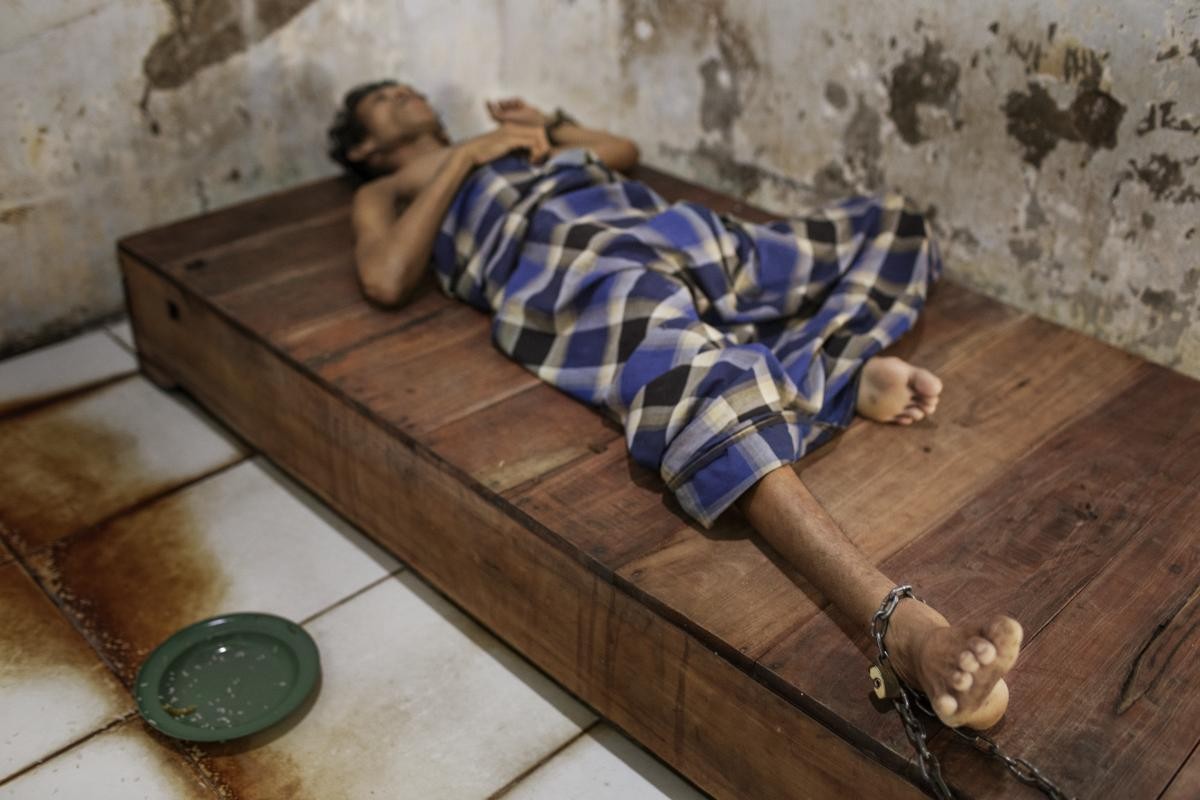Questioning our dignity in mental health
Change Size
 A male resident is chained to a wooden platform bed at the Bina Lestari healing center in Brebes, Central Java. The chain is so short that it does not allow him to move around and he is forced to eat, sleep, and urinate in this room. © 2016 Andrea Star Reese for Human Rights Watch (Courtesy of Human Rights Watch/Andrea Star Reese)
A male resident is chained to a wooden platform bed at the Bina Lestari healing center in Brebes, Central Java. The chain is so short that it does not allow him to move around and he is forced to eat, sleep, and urinate in this room. © 2016 Andrea Star Reese for Human Rights Watch (Courtesy of Human Rights Watch/Andrea Star Reese)
E
very year, we commemorate World Mental Health Day (WMHD) on Oct. 10 to promote mental health education, awareness and advocacy globally. In some countries, this day is part of the larger Mental Illness Awareness Week. It matters because mental health is an extremely important issue worldwide due to the impact on the human rights and quality of life of those affected and their families.
The theme for this year’s WMHD is “Dignity in Mental Health — Psychological and Mental Health First Aid for All”. There are two underlying aspects to be understood: dignity in mental health and psychological first aid. Indonesia has been tackling and will continue to face these two challenges.
Speaking of dignity, we should address the stigma associated with mental illness so that dignity is upheld and respected.
Despite the fact that Indonesia has enforced its Mental Health Law since 2014 in a bid to defend the rights of people with mental problems and disorders, international media and organizations such as Human Rights Watch have deemed little has changed in the country.
The critics have grown impatient with our pledge to uphold dignity in mental health as no action has been taken to eradicate human rights violations in the form of shackling/caging/locking practices.
In 2013, the Health Ministry’s National Health Research found the number of people with mental disorders who were restrained (pasung) had risen to 56,000 from 18,000 in 2011. It is a devastating fact and Indonesia is overwhelmed.
Indeed we can put an end to human rights violations by strictly enforcing the Mental Health Law.
What is particular about the law? The Mental Health Law, No. 18/2014, is ambitious in playing a role as a new foundation for the Indonesian mental health system. It deals with, among other issues, mental healthcare, the mental healthcare system, resources in mental healthcare delivery and mental health examination.
The concluding provision points out that the implementing regulations of this law must be in place no later than one year after its enactment. We’re running behind schedule — with only one derivative regulation completed — but we still dare to put our hopes in the government, especially with its “mental revolution” jargon.
With increasing ill behavior, suicides, natural disasters — ranging from volcanic eruptions, to floods, landslides and tsunamis, etc., the fourth-largest population in the world, with its multidimensional problems, Indonesia, will survive as a nation by implementing our own National Mental Health Law as the foundation of our new and reformed mental healthcare system.
This is where the second point of this year’s WMHD theme plays a major role. Many people require basic psychological and mental health first aid to prevent their health from deteriorating and to encourage them to act to improve their mental health.
Psychological first aid is first-line psychosocial support after a crisis occurs. In various countries, psychological first aid has been incorporated into disaster preparedness and response.
Indonesia is prone to natural disasters and the Health Ministry is aware of regionalization in disasterprone areas.
But this awareness contributes to no avail should those people facing natural disasters be gripped with helplessness.
The 2010 eruptions of Mount Merapi, billed as the largest since the 1870s, claimed 353 lives and displaced 350,000 others.
As a House of Representatives member, I teamed up with experts to propose a model project, Psychological First Aid (PFA) on-the-job training for 200 community Mental Health Nurses from five mental hospitals in Central Java to help the survivors of the volcanic eruption.
Unfortunately, the Health Ministry’s budget for the emergency phase was insufficient. Fortunately, the National Disaster Mitigation Agency (BNPB) approved my proposal for PFA. The training was to provide the nurses with standardized competence and qualification in the Inter-Agency Standing Committee (IASC) Guidelines on Mental Health and Psychosocial Support in Emergency Settings.
Building on this experience, national disaster management authorities may consider having teams ready who could travel to disasteraffected regions to orient local first responders in psychological first aid when disaster strikes.
This model project is deemed necessary and continues to be implemented by the Health Ministry today. At large, the world is going through a crisis, but apart from the catastrophic events, psychological and mental distress can happen anywhere — in the workplace, in the supermarket, in our homes, in our schools, on the transportation system, in public spaces and in hospitals.
Psychological and mental health first aid is a potentially life-saving skill that we all need to have.
Psychological first aid may also be included in training for workers who meet trauma survivors as part of their daily job, such as firemen, police officers, health staff in hospital emergency units, community mental health nurses, psychologists, and, of course, humanitarian aid workers.
Indonesia may constantly face questions about its commitment to human rights, but those doubters should use clearer spectacles to notice the concerted efforts of the government, the House and the community to build a better mental health system.
--
The writer, who chaired the working committee drafting of the mental health bill in the House of Representatives (2012—2014), is a psychiatrist and a PhD candidate in public health at the University of Indonesia. She is also a research scholar alumnus in mental health implementation research with the Harvard Medical School, US.








